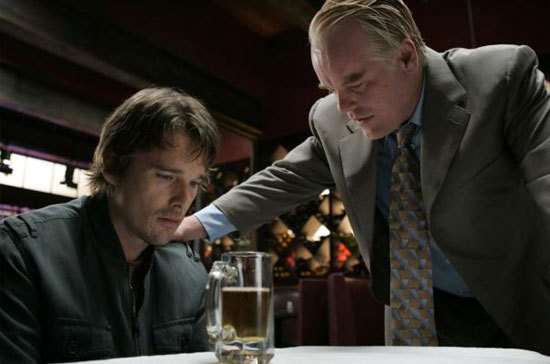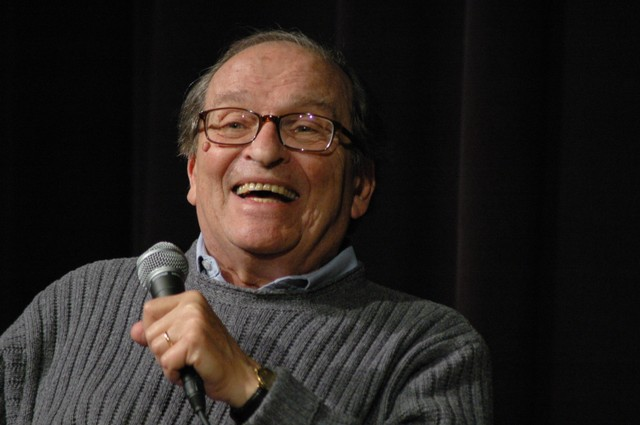
Sidney Lumet made over forty films before dying at age 86. He made several masterpieces – which I’ll get to – but first I would like to get to the last one he made. If you are new to him you should know that at age 83 he made one of his best films, “Before the Devil Knows You’re Dead.” It received no Oscar nominations in 2007 even though, to me, Phillip Seymour Hoffman gave the greatest 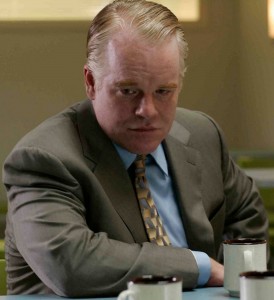 performance of his career as a drug-addict businessman who plots with his own brother Ethan Hawke to knock off their parent’s own jewelry store with disastrous results. It unfolds in a backwards-chain lapidary style a lá Tarantino that replicates the crime and the roots of destructive behavior from an ensemble of multiple perspectives. Few that have seen it would be able to forget Marisa Tomei’s superb performance, nor the performances of Michael Shannon, Bryan F. O’Byrne and Albert Finney even though some might forget those actor’s names.
performance of his career as a drug-addict businessman who plots with his own brother Ethan Hawke to knock off their parent’s own jewelry store with disastrous results. It unfolds in a backwards-chain lapidary style a lá Tarantino that replicates the crime and the roots of destructive behavior from an ensemble of multiple perspectives. Few that have seen it would be able to forget Marisa Tomei’s superb performance, nor the performances of Michael Shannon, Bryan F. O’Byrne and Albert Finney even though some might forget those actor’s names.
When that film came out a few questions occurred to me: How can a man at 83 still embed the discipline to make a nonlinear thriller, make it make sense, and do it so well? What kind of film is he going to follow-up with after creating this level of a masterwork? The answer to that one is that he didn’t make another film. But before he died Saturday, April 9th, 2011 of lymphoma it reiterated often in me that whenever I thought of “Devil” I also wondered what kind of film he was going to follow up with. The film he made before that one was “Find Me Guilty” (2006) with Vin Diesel cast against type (Diesel a non-actor proving that he could be an actor) was a leisurely amusing mobsters-in-court comedy-drama but also one you would expect a seasoned old man would direct. You would never have expected Lumet to have had the tireless energy needed to make a cubic head-spinner that was “Devil.” Truly, why it was met with such little box office business I’ll never know.
The film fanatic in me was crushed to hear that Lumet died. It really was true that I hotly anticipated his next film. Whether it was a small grounder or a swing for the fences I would have been earnestly in awe for anything by him. The curmudgeon in me also got annoyed that in most obituary headlines it reads “12 Angry Men” director dies referring to his critical and award 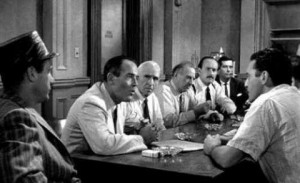 acclimated debut from 1957. That film was about as good as you could ever possibly get with something that takes place entirely inside a room for its complete running time for story about deconstructing a murder trial in a juror’s chamber. But it has been long over-hailed, and I say that because I worry that if people just stick to just that one, then so much other output from a great New York based director would be missed.
acclimated debut from 1957. That film was about as good as you could ever possibly get with something that takes place entirely inside a room for its complete running time for story about deconstructing a murder trial in a juror’s chamber. But it has been long over-hailed, and I say that because I worry that if people just stick to just that one, then so much other output from a great New York based director would be missed.
In a way, “Devil” was the fanciest and trickiest film Lumet ever made. As a director he should be defined for his gritty, hardnosed craftsmanship.
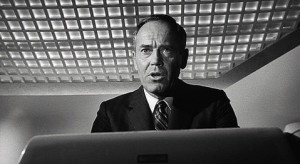 “Fail-Safe” (1964) is the other nuclear arms doomsday vision to coincide the same year as Stanley Kubrick’s masterpiece “Dr. Strangelove.” I didn’t see this Lumet entry until last year because for years I arrogantly figured that it had to pale in comparison to Kubrick’s milestone. Lumet’s take is hardly anemic, so only now do I insist that both films work as companion pieces to one another. Henry Fonda is the President, the Russians are the bombing target.
“Fail-Safe” (1964) is the other nuclear arms doomsday vision to coincide the same year as Stanley Kubrick’s masterpiece “Dr. Strangelove.” I didn’t see this Lumet entry until last year because for years I arrogantly figured that it had to pale in comparison to Kubrick’s milestone. Lumet’s take is hardly anemic, so only now do I insist that both films work as companion pieces to one another. Henry Fonda is the President, the Russians are the bombing target.
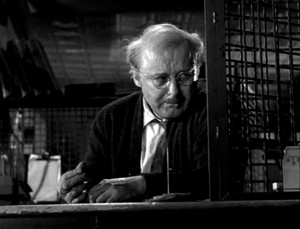 “The Pawnbroker” (1964) really stands out as a guilt, grief and trauma piece of a Jewish shopkeeper (Rod Steiger) haunted by survival memories in the Holocaust concentration camps. Many other WWII films from the late 1950’s thru 60’s are not only dated but in hindsight so sparse and mild on genuine Nazi evil that they now come off as insensitive and unjust. Lumet’s film is more honestly aware and pertinent.
“The Pawnbroker” (1964) really stands out as a guilt, grief and trauma piece of a Jewish shopkeeper (Rod Steiger) haunted by survival memories in the Holocaust concentration camps. Many other WWII films from the late 1950’s thru 60’s are not only dated but in hindsight so sparse and mild on genuine Nazi evil that they now come off as insensitive and unjust. Lumet’s film is more honestly aware and pertinent.
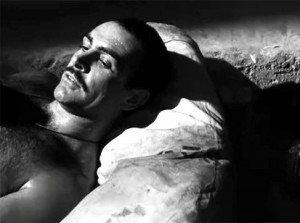 “The Hill” (1965) with Sean Connery takes place at a British stockade in North Africa during World War II. New prisoners learn immediately that they are at the mercy of abusive Staff Sergeants. Among the grueling punishments is to hike “double-time” over a fatiguing hill which results in the death by heat exhaustion of one prisoner. This is a brilliantly directed picture that would be as hardcore had it been made today. The corrections officers are mean and rabid enough to really piss you off, and you hold your breath hoping for an insurrection by inmates of some kind. Essential.
“The Hill” (1965) with Sean Connery takes place at a British stockade in North Africa during World War II. New prisoners learn immediately that they are at the mercy of abusive Staff Sergeants. Among the grueling punishments is to hike “double-time” over a fatiguing hill which results in the death by heat exhaustion of one prisoner. This is a brilliantly directed picture that would be as hardcore had it been made today. The corrections officers are mean and rabid enough to really piss you off, and you hold your breath hoping for an insurrection by inmates of some kind. Essential.
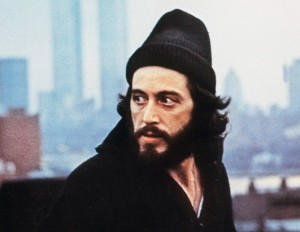 “Serpico” (1973) is a true to life exposé on New York City Police Department corruption, often cited as one of Al Pacino’s essential performances as the titular hero cop. Pacino gets to do one of his grungiest looks, thick-bearded for his undercover police work. Intriguing, flavorful episodes and anecdotes takes a big bite out of New York.
“Serpico” (1973) is a true to life exposé on New York City Police Department corruption, often cited as one of Al Pacino’s essential performances as the titular hero cop. Pacino gets to do one of his grungiest looks, thick-bearded for his undercover police work. Intriguing, flavorful episodes and anecdotes takes a big bite out of New York.
 “Murder on the Orient Express” (1974) is less serious and more a yarn based on one of Agatha Christie’s mysteries with an all-star cast on a train that plays out like “Clue” the board game. But it has brainier and more deceiving playing pieces, with Albert Finney as the finnicky detective and an all-star cast as the suspects. Lumet has fun with the Whodunnit format.
“Murder on the Orient Express” (1974) is less serious and more a yarn based on one of Agatha Christie’s mysteries with an all-star cast on a train that plays out like “Clue” the board game. But it has brainier and more deceiving playing pieces, with Albert Finney as the finnicky detective and an all-star cast as the suspects. Lumet has fun with the Whodunnit format.
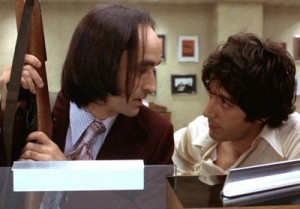 “Dog Day Afternoon” (1975) is essential to anyone that takes cinema seriously. Or Al Pacino or Sidney Lumet seriously. Pacino’s cinematic birthright was as Michael Corleone, but his work as Sonny the bank robber who pulls a stick up so he can get his gay lover a sex-change operation is to me the greatest performance of a shining career. And once again talking about Lumet’s ability to get flavor, this is as close to New York flavor for a 1970’s time capsule that you are going to find. Based a true story, the robbery turned into a hostage scenario that turned into a 12-hour plus affair and media frenzy. Sonny wins public sympathy for the news cameras which made it hard for the police to take him down. There have been fictional knock-offs of the plot done on other countless movies since then, many of them idiotic. Essential.
“Dog Day Afternoon” (1975) is essential to anyone that takes cinema seriously. Or Al Pacino or Sidney Lumet seriously. Pacino’s cinematic birthright was as Michael Corleone, but his work as Sonny the bank robber who pulls a stick up so he can get his gay lover a sex-change operation is to me the greatest performance of a shining career. And once again talking about Lumet’s ability to get flavor, this is as close to New York flavor for a 1970’s time capsule that you are going to find. Based a true story, the robbery turned into a hostage scenario that turned into a 12-hour plus affair and media frenzy. Sonny wins public sympathy for the news cameras which made it hard for the police to take him down. There have been fictional knock-offs of the plot done on other countless movies since then, many of them idiotic. Essential.
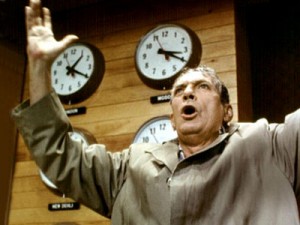 “Network” (1976) with Peter Finch, William Holden and Faye Dunaway is one of the supreme masterpiece satires of the twentieth century with Lumet and writer Paddy Chayefsky ridiculing television for its foray into crass commercialization. It prophesized the whole trash talk show host, reality show, and violence exploitation as news craze that was to eventually permeate American television as we know it. Essential.
“Network” (1976) with Peter Finch, William Holden and Faye Dunaway is one of the supreme masterpiece satires of the twentieth century with Lumet and writer Paddy Chayefsky ridiculing television for its foray into crass commercialization. It prophesized the whole trash talk show host, reality show, and violence exploitation as news craze that was to eventually permeate American television as we know it. Essential.
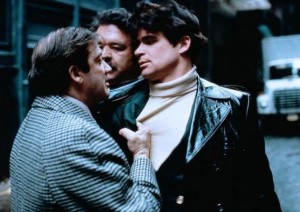 “Prince of the City” (1981) was a gripping, more ambitious and definitely longer in scope (167 minutes) docudrama on New York City police corruption. Treat Williams stars as an informant cop who rats on his colleagues in Narc and then faced ceaseless attempts on his own life. A good deal of the film is embedded in the investigation proceedings to credit or discredit the informant’s claims.
“Prince of the City” (1981) was a gripping, more ambitious and definitely longer in scope (167 minutes) docudrama on New York City police corruption. Treat Williams stars as an informant cop who rats on his colleagues in Narc and then faced ceaseless attempts on his own life. A good deal of the film is embedded in the investigation proceedings to credit or discredit the informant’s claims.
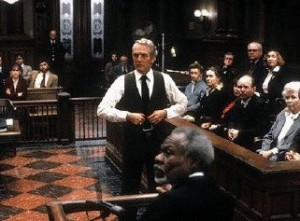 “The Verdict” (1982) with the ever-impressive Paul Newman transcends the courtroom drama genre. Not because it has concocted the mother of all court cases, but because it touches a deep chord in how the real truth can be tampered by factual evidence, yes factual evidence, removing human empathy within the mechanics of a courtroom. The idea that the emotional truth in a malpractice suit means more than factual evidence is something that can occur, and sometimes only a great lawyer can communicate that to a jury. Except that Newman’s Frank Galvin is not a great lawyer, he’s an alcoholic lawyer falling from reputation. Galvin plunges into every last resource he can and even uses piteousness to bring soul into the cold soulless boundaries of a courtroom. Whether that matters is up to a jury to decide, then again, perhaps it is up to a heartless judge ready to sustain objection to every move Galvin makes. Essential.
“The Verdict” (1982) with the ever-impressive Paul Newman transcends the courtroom drama genre. Not because it has concocted the mother of all court cases, but because it touches a deep chord in how the real truth can be tampered by factual evidence, yes factual evidence, removing human empathy within the mechanics of a courtroom. The idea that the emotional truth in a malpractice suit means more than factual evidence is something that can occur, and sometimes only a great lawyer can communicate that to a jury. Except that Newman’s Frank Galvin is not a great lawyer, he’s an alcoholic lawyer falling from reputation. Galvin plunges into every last resource he can and even uses piteousness to bring soul into the cold soulless boundaries of a courtroom. Whether that matters is up to a jury to decide, then again, perhaps it is up to a heartless judge ready to sustain objection to every move Galvin makes. Essential.
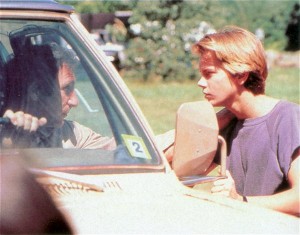 “Running on Empty” (1988) is a great human story of a hippie family on the run and in hiding for more than a decade. Don’t just see it for Lumet, see it for the first terrific performance that River Phoenix made. Since a Vietnam War protest the Arthur and Annie Pope (Judd Hirsch and Christine Lahti) have been fugitives. Their son (Phoenix) has been strung along city to city, school to school for years but now has found promise in first-time love and in a hopeful vocation as long as the family never relocates. The son has to choose to stick with his parents or etch a life for himself and risk never seeing them again.
“Running on Empty” (1988) is a great human story of a hippie family on the run and in hiding for more than a decade. Don’t just see it for Lumet, see it for the first terrific performance that River Phoenix made. Since a Vietnam War protest the Arthur and Annie Pope (Judd Hirsch and Christine Lahti) have been fugitives. Their son (Phoenix) has been strung along city to city, school to school for years but now has found promise in first-time love and in a hopeful vocation as long as the family never relocates. The son has to choose to stick with his parents or etch a life for himself and risk never seeing them again.
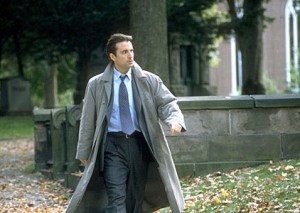 “Night Falls on Manhattan” (1997) with Andy Garcia as a one-time policeman turned lawyer who lands a case prosecuting the drug peddler who shot and injured his policeman dad during the arrest. During the court procedure, many unsettling and unflattering facts come out that would better if left swept under the rug. There is a morality decision that must be made on whether to deliberately taint evidence to protect Garcia’s father and the precinct itself.
“Night Falls on Manhattan” (1997) with Andy Garcia as a one-time policeman turned lawyer who lands a case prosecuting the drug peddler who shot and injured his policeman dad during the arrest. During the court procedure, many unsettling and unflattering facts come out that would better if left swept under the rug. There is a morality decision that must be made on whether to deliberately taint evidence to protect Garcia’s father and the precinct itself.
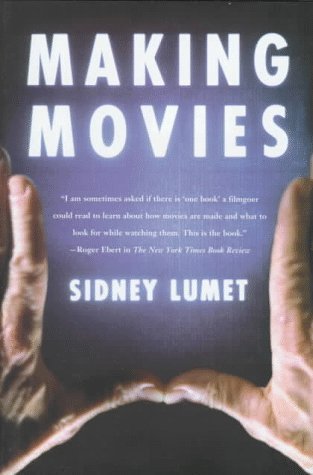 He was nominated for five Oscars but never won. Most of those occasions I would guess the votes for him came in second, although he did receive the Honorary Lifetime Achievement award at the Oscars in 2004. He also wrote the incredibly useful book for film students “Making Movies” in the 1980’s. But for always when we think about New York movies, Lumet will not be forgotten as a key chronicler.
He was nominated for five Oscars but never won. Most of those occasions I would guess the votes for him came in second, although he did receive the Honorary Lifetime Achievement award at the Oscars in 2004. He also wrote the incredibly useful book for film students “Making Movies” in the 1980’s. But for always when we think about New York movies, Lumet will not be forgotten as a key chronicler.
